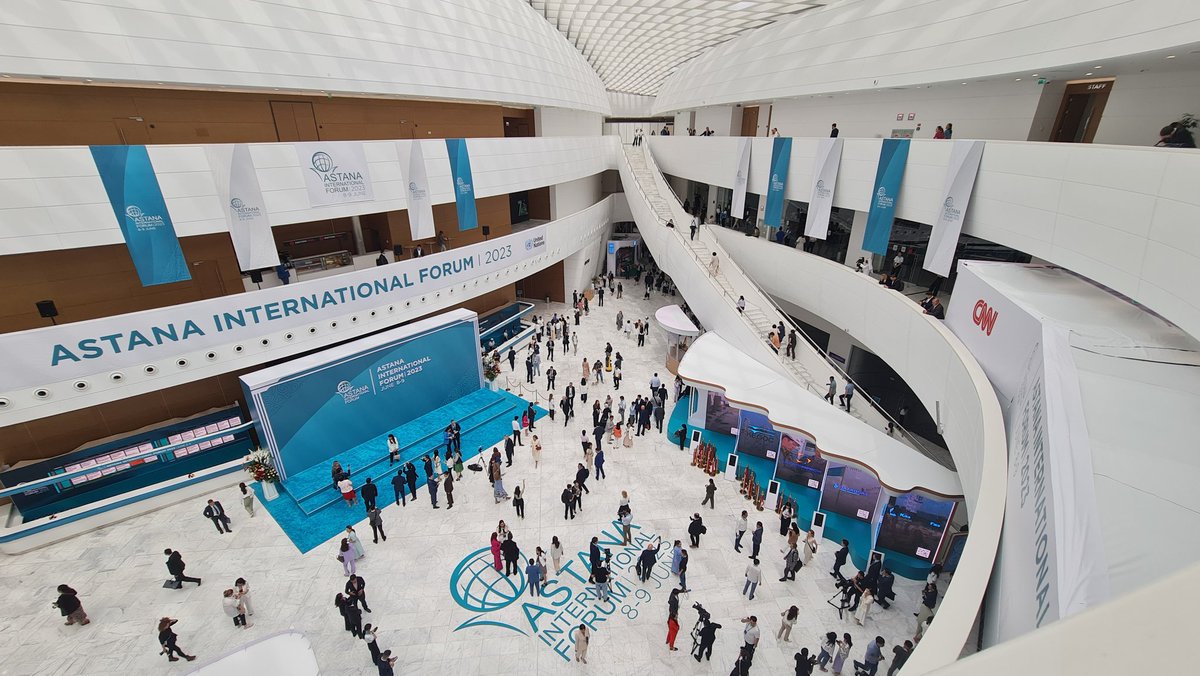At the Astana International Forum on June 8-9, Kazakhstan launched a new diplomatic initiative that calls for dialogue among the Middle Powers as a way “to amplify voices for peace, progress and solidarity” at a time of heightened polarization and unprecedented geopolitical divisions across the world.

Photo credit: AIF press service.
Kazakh President Kassym-Jomart Tokayev’s keynote address at the forum’s plenary session set the stage for the more than 4,000 participants when he said that “for the global [international] system to survive, it must work for everyone, promoting peace and prosperity for the many rather than for the few.”

Javier M. Piedra.
His words reinforced his past declarations on the matter: “We all know that global peace and stability are currently under threat by tensions between major world powers.”
It takes courage to utter those words with CNN’s and the British Broadcasting Corporation’s cameras rolling.
The forum’s agenda was comprehensive, covering topics from food security, water management and capital flows to the role of the United Nations, economic integration, and the need for the Middle Powers to embrace responsible statecraft because of its absence elsewhere.
Measured by the scope of international media coverage, Kazakhstan has once again come through with the goods, garnering the attention of the international community at a time of crisis.
Presidents, prime ministers, academics and businesspeople attended the forum. Common sense permeated the discussions, rather than the usual bombast common at so many other confabs.
While Eurasian integration featured large, the need for Middle Power agency in foreign affairs emerged as a critical way to influence the Great Powers. There were even open calls for the resurrection of the Non-Aligned Movement birthed at the 1955 Bandung Conference, or something similar.
Not unexpectedly, the audience came alive when Mulatu Teshome, former president of Ethiopia, and Željka Cvijanović, chairwoman of the Presidency of Bosnia and Herzegovina, highlighted the dangers of foreign meddling in their respective and/or neighboring countries.
The Ethiopian Herald, for example, ran an article titled “Pan-Africanism enhances Africa’s global participation,” which reported what Teshome said: “External interference would fuel problems, and we don’t want the situation of Yemen and Libya replicated in our region.”
On the sidelines of the forum, delegates with whom this writer spoke made it clear that the Great Powers should stop demanding that Middle Powers take sides in their problems.
One was reminded of what Indian External Affairs Minister Subrahmanyam Jaishankar said not that long ago: “Europe has to grow out of the mindset that Europe’s problems are the world’s problems, but the world’s problems are not Europe’s problems.”
The forum’s primary focus highlighted that peace must be predicated on smart and respectful diplomatic engagement based on the founding principles of the United Nations rather than on ideologically driven one-upmanship, lingering neocolonial attitudes, or a preponderance of power in a struggle for limited natural resources in a fiercely competitive and merciless world.
Geopolitical bloc mentalities
Tokayev said, “We are witnessing the return of earlier bloc mentalities unseen for 30 years. The forces of division are not purely geopolitical. They are also motivated by economic undercurrents.
“Economic policy itself is openly weaponized. These confrontations include sanctions and trade wars, targeted debt policies, reduced access [to] or exclusion from financing, and investment screening. Together these factors are gradually undermining the foundation upon which rests global peace and prosperity over recent decades: free trade, global investment, innovation, and fair competition.”
Tokayev continued: “This [approach to foreign policy] in turn fuels social unrest and division within states and tensions between them. Rising inequality, social divides, widening gaps in culture and values: all these trends have become existential threats.”
These are serious words coming from a seasoned diplomat and head of state, and they captured much of the spirit at the forum, at least from representatives of the Middle Powers. The delegates agreed that it’s time for the Great Powers to engage all nations as adults rather than as pawns in a larger game.
Tokayev also confidently reaffirmed the following: “I would like to emphasize the key role of Kazakhstan in the Belt and Road Initiative, which promotes economic development and intraregional connectivity.” Astana will deal with Beijing, like it or not, if it suits Kazakhstan’s interests and the common good of the region.
Be that as it may, in recent years, Great Power hubris – perhaps unbeknownst to its cheerleaders – has become dangerously counterproductive for peace and stability because it has reduced diplomacy to a dodgy game of intrigue and ambition that abhors compromise and feeds off starry-eyed ideologies and implacable moralizing.
Kazakhstan and the Middle Powers
Tokayev managed to bring together most of the Middle Powers from Asia, Africa and the Middle East in Astana, though Latin America was poorly represented. The delegates signaled that they are no longer going to sit around idly and watch whole regions of the world sink into chaos and conflict because of showdowns and face-offs between Great Powers.
The forum served as a welcome alternative to the recent Hiroshima Group of Seven Summit and its members’ obsession with evangelical-like moralizing about the promotion of open, transparent, resilient, and sustainable societies, while mostly skipping over the hard business of improving the very economic conditions needed for genuine human development.
In Astana, adherents to a unipolar worldview were few and far between. The forum confirmed that an agenda for global peace and security requires multilateral responses and diplomatic compromise rather than pitting one bloc against another, weaponizing economic policy and finance or by playing one country’s national interests off against another’s.
As Tokayev reaffirmed at the Astana International Forum, “I am optimistic that constructive discussions in the next two days can begin to move us towards potential solutions and further collaboration. Let me end with a gentle warning. To foster meaningful conversation and cooperation, open-mindedness, tolerance, and compromise are required.”
The Astana International Forum is planned to take place every year. Let us hope that the Great Powers will listen.
The author is Javier M. Piedra, a financial consultant, specialist in international development and former deputy assistant administrator for South and Central Asia at USAID.
This opinion was first published by Asia Times and is reprinted with the author’s permission.

